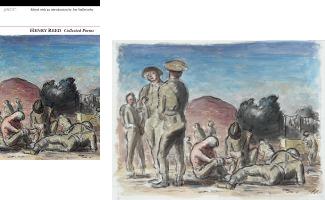Now featured is a tantalizing thumbnail of the book cover. I must admit, at first glance I was disappointed, but then I dug a little deeper, and I have to say, I heartily approve of Carcanet's choice! The copyright note on the page reads, "Cover image 'Troops Resting' (detail) by Edward Ardizzone. Crown copyright, reproduced by permission of the Imperial War Museum."
Edward Ardizzone (1900-1979) was born in Haiphong, in French Indo-China. Educated in England, he took evening classes at the Westminster School of Art while working as a clerk with the Eastern Extension Telegraph Company, eventually becoming a freelance artist and illustrator. He earned recognition through solo exhibitions, and by illustrating for books and popular periodicals.
In 1940, Ardizzone was serving as a Second Lieutenant in an anti-aircraft battery in London when he was appointed an official War Artist by the War Artists Advisory Committee. He tagged along with the British Expeditionary Force through France and Belgium, and served in North Africa. In 1943, he put joined up with the troops invading Sicily, and within a week of the D-Day landings he was in Normandy.
The Imperial War Museum's record for Ardizzone's painting has a modest description which reads like a stanza from Reed's "Judging Distances":
A group of soldiers sit on the ground. One is slumped forward the other is cleaning his rifle. A third has his back to the viewer and is lying stretched out on the ground. To the left of this group some other solders stand around chatting. In the background there is a truck near some trees.
You can view a larger version of "Troops Resting" on the Imperial War Museum's website. (Or, you can query their art collection for "Ardizzone" to see their extensive holdings.) The Museum also has a special exhibition of his sketchbook and war diary. And here's an image search for Ardizzone's work.








